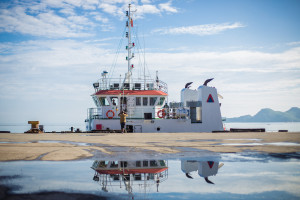Fiscal Reform of the Government incorporates the adoption of the Arucha Declaration

With the adoption of the terms of the 2003 Arucha Declaration, the Council of Ministers provided the country with an important instrument of control of customs corruption, to be integrated into the Fiscal Reform underway in the country.
“Corruption severely limits the capacity of Customs to collect revenue, protect borders and control the movement of goods,” said Vice Minister of Finance Helder Lopes. “The Declaration acknowledges this and sets out a series of regulations and guidelines that help Customs prevent and combat corruption.”
“The principles contained in the Declaration are for both public and private sector institutions. We hope this signals to the private sector that the Government is serious about combatting corruption. The cooperation of the private sector to support this important initiative is critical to facilitate trade,” continued Vice Minister Lopes.
The Timor-Leste Customs Authority will begin to immediately implement the principles of the Arusha Declaration. “The approval of the New Customs Code and the Arusha Declaration establishes a solid foundation to raise the integrity of Customs,” said Fernanda Borges, Coordinator of the Fiscal Reform Commission. “Practical steps the Fiscal Reform Commission and Customs are presently taking include drafting a new code of conduct, customs procedures, bringing in modern IT systems and making significant investments to develop human resources.”
Customs administrations around the world play a key role in trade facilitation, revenue collection, community protection and national security. As such, the lack of integrity in Customs can distort trade and investment opportunities, undermine public trust in government administration and ultimately jeopardise the well being of all citizens. Integrity is a prerequisite for the proper functioning of a Customs administration.
In 2003, the World Customs Organisation together with its member states discussed the key factors to prevent corruption and increase the level of integrity in Customs. The result was the Revised Arusha Declaration- the original declaration was adopted in 1993. By adopting the Revised Declaration, WCO member states commit to improve integrity through self-assessment, action planning, implementation and evaluation. Timor-Leste has been a member of the WCO since 2003 and is now in a position to fully adopt the Declaration of Arucha.










































